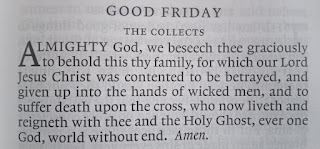A short meditation on Cranmer's Good Friday collect
Similarly, at the collect's conclusion, et crucis subire tormentum ('the torture of the cross') becomes the more wholesome 'and to suffer death upon the cross', restoring a Scriptural and patristic sense of the Cross in place of a reference which could have been understood as expressing an unhealthy late medieval Latin cult of the agonies of the Crucified.
This short meditation on Cranmer's Good Friday collect is offered as a means of drawing out something of the richness of this prayer on the day when, in the words of the Homily of the Passion, for Good Friday, we gather to "steadfastly behold Christ crucified, with the eyes of our heart".
to behold this thy family - here a rich Scriptural image is at work, evoking the Fourth Gospel's description of the Lord's Passion being the means to "gather together in one the children of God that were scattered abroad" (John 11:52). We might also think of Cranmer's "thy tender mercy" in the Prayer of Consecration. It is the love and mercy of God in the Passion of Christ which gathers us before the Cross on Good Friday.
for which our Lord Jesus Christ - there is a creedal quality to this phrase, echoing both the Apostles' Creed at Mattins and Evensong, and the Nicene Creed on Ante-Communion. Here the Church's solemn prayer on Good Friday is grounded in the Christological confession which articulates the witness of the Scriptures: that the Crucified is Word made flesh, one with Father, Lord and God.
contented to be betrayed - this evokes the Words of Institution in the holy Supper, the sobering reminder each time the Sacrament is administered that the Passion is characterised by profound ecclesial failure: betrayed by an apostle, denied by an apostle, abandoned by the apostles. The Church must be penitent and cannot be proud before the Lord's Cross.
given up into the hands of wicked men - contemporary translations of the collect use the more inclusive 'sinners'. But we might wonder about this. It was, after all, men who tried, tortured, and crucified Him. The use of 'men', then, draws us to the realities of the Passion in the Gospel narratives: trial, mocking, scourging, nails.
As for 'wicked', we certainly cannot confine it to those immediately involved in the Passion. The opening Sentence at Mattins and Evensong, after all, addresses us: "When the wicked man turneth away from his wickedness that he hath committed". The Exhortation at Mattins and Evensong calls us to "acknowledge and confess our manifold sins and wickedness". To call them 'wicked' is merely to say that they are like us.
to suffer death upon the cross - the stark nature of this phrase is particularly appropriate for Good Friday. No words are added to explain the meaning and purpose of the Cross. We are confronted by the reality of the Lord's death. Here too is reflected the creedal affirmation at Mattins and Evensong: "crucified, dead, and buried". Here is the centre. This death from which life flows.
who now liveth and reigneth - the collect's doxology is a glorious proclamation declaring that to say 'Cross' is necessarily to also say 'Resurrection'. And that to say 'Resurrection' is necessarily to also say 'Cross'. This follows the 1662 Litany which, in contrast to many contemporary versions, rightly holds together the events of the Paschal Mystery: "By thine Agony and bloody Sweat; by thy Cross and Passion; by thy precious Death and Burial; by thy glorious Resurrection and Ascension; and by the coming of the Holy Ghost, Good Lord, deliver us". We gather before the Cross on this day because the Crucified is the Resurrection and the Life.




Comments
Post a Comment